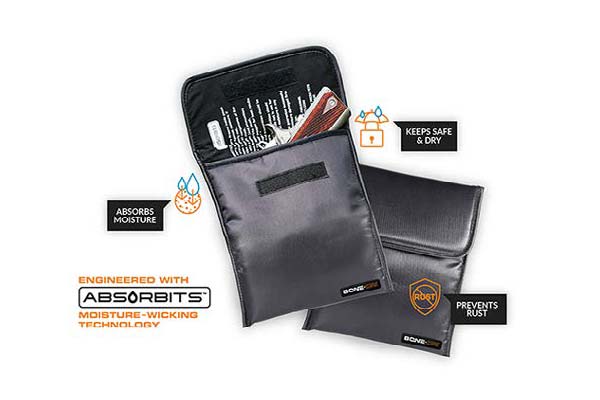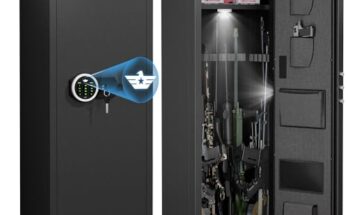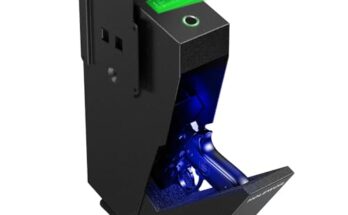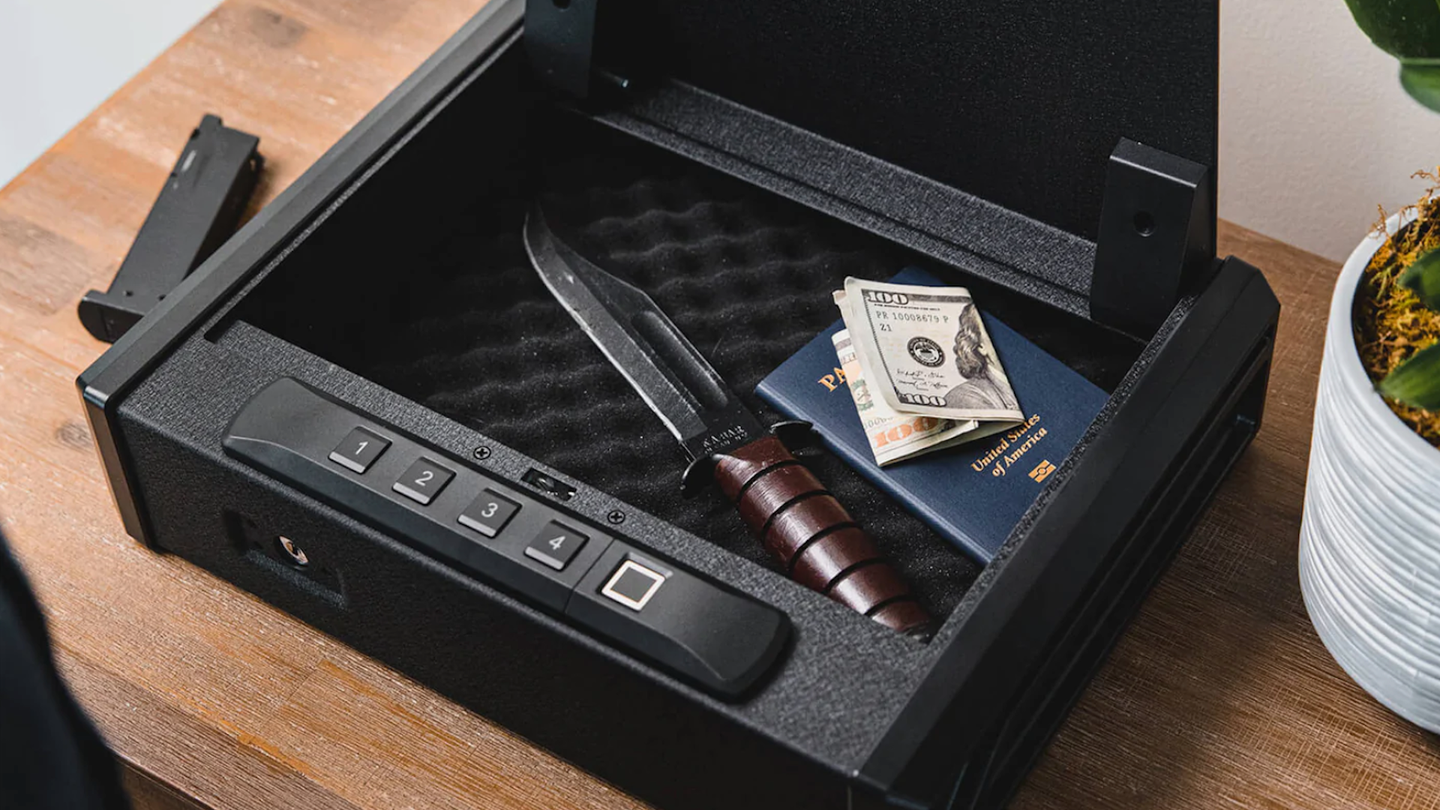To keep moisture out of your gun safe, use dehumidifiers and maintain a stable temperature. Proper sealing and regular checks for humidity levels also help.
Ensuring your firearms remain in pristine condition involves keeping moisture at bay. A damp interior can cause rust and damage, compromising the functionality and safety of your weapons. Gun safe owners must create a dry environment within the safe to prevent such issues.
This short guide offers practical tips to protect your investment from damaging humidity. As gun safes vary in size and construction, the solutions may differ, but the fundamentals of moisture control remain consistent across all models. Implementing these measures guarantees the longevity of your firearms by maintaining an optimal storage atmosphere. Keep reading to find out how to effectively safeguard your gun safe from the harmful effects of excessive moisture.
The Dangers Of Moisture In Gun Safes
The dangers lurking in the shadowy corners of gun safes are often less dramatic than the firearms they contain. But make no mistake, moisture is a silent destroyer that can wreak havoc on your valuable collection. Understanding the risks is the first step towards protection.
Corrosion And Damage To Firearms
Ferrous metals, like those found in guns, are highly susceptible to rust. When moisture infiltrates a gun safe, it creates the perfect storm for corrosion to take hold. Corroded firearms are not just unsightly—they can become unsafe to operate. The moisture can also cause ammunition to degrade, potentially leading to misfires or failure to discharge when you need them most.
- Barrel rust: Leads to accuracy problems
- Action corrosion: Hinders reliable operation
- Ammunition damage: Poses a safety risk
Potential For Mold And Mildew Growth
Moisture does not just stop at causing rust; it sets the stage for mold and mildew to flourish. Beyond the unpleasant odor and appearance, mold can compromise your health and the safe’s interior. Items like holsters and cases made from organic materials are particularly at risk of fungal attacks.
| Issue | Impact |
|---|---|
| Mold growth | Degrades air quality and surfaces |
| Mildew presence | Causes musty odors and stains |
Regular inspection and maintenance are essential to guard against these insidious issues. Utilizing desiccants or a dehumidifier can help keep your safe dry and secure. It’s not just about gun safety—it’s about preserving the integrity and reliability of your firearms for years to come.
Key Factors Contributing To Safe Humidity
Understanding the key factors contributing to safe humidity is crucial for gun safe maintenance. Maintaining the right balance prevents rust and damage to firearms. Let’s explore the key factors affecting humidity levels in your gun safe.
Climatic Conditions And Geographic Location
The climate and location of a gun safe play a significant role in its internal humidity levels. Areas with high moisture in the air naturally increase the risk of safe humidity. It’s important to know your region’s typical climate to take proper preventive measures.
- Coastal areas: Higher salt content can lead to corrosion.
- Rainy regions: Constant dampness affects safe conditions.
- Dry areas: Potential static issues with electronic locks.
Indoor Humidity Levels And Ventilation
Keeping an eye on indoor humidity levels ensures the safe’s internal environment stays dry. Proper ventilation is crucial. A lack of air circulation can trap moisture inside the safe. Use hygrometers to monitor humidity levels regularly.
| Location | Optimal Humidity Range |
|---|---|
| Living Spaces | 30-50% |
| Basements | 40-60% |
Frequency Of Safe Opening
How often you access your gun safe affects moisture control. Each opening allows new air inside. This can introduce or remove moisture. Striking a balance is key to maintaining stable conditions.
- Open the safe at regular intervals for air exchange.
- Limit opening during humid days to avoid moisture buildup.
- Consider using a dehumidifier rod for constant moisture control.
Traditional Techniques For Moisture Control
Gun safes need protection from moisture to prevent rust and damage to firearms. Effective moisture control can be achieved through time-honored methods without relying on complex technology. Let’s explore traditional yet efficient ways to keep your gun safe dry.
Usage Of Silica Gel Packs
Silica gel packs are a popular choice for keeping moisture at bay.
- Place them around the safe’s interior.
- Renew them by drying them out periodically.
- They absorb moisture effectively.
Benefits Of Renewable Dehumidifiers
Renewable dehumidifiers work without power and are easy to use.
- Rechargeable by heating to release absorbed moisture.
- Last for years, providing cost-effective moisture control.
- Environment-friendly since they require no power.
Placement Of Desiccant Containers
Proper placement of desiccant containers is crucial for maximum effectiveness.
| Location in Safe | Action |
|---|---|
| Near the base | Capture moisture that settles. |
| Next to sensitive items | Protect from direct moisture exposure. |
| Spread evenly | Ensure overall humidity control. |
Technological Advances In Humidity Regulation
Technological Advances in Humidity Regulation have revolutionized the way firearms are maintained. Traditional methods of moisture control in gun safes are making way for innovations. These smart solutions preserve the integrity of your weapons. They ensure that your firearms are ready for use at a moment’s notice.
Electric Dehumidifier Rods
Electric dehumidifier rods work by heating the air inside the safe. This prevents moisture buildup. A stable temperature reduces the chance of rust and corrosion on metal surfaces. These rods come in various sizes. They fit different safe dimensions seamlessly.
- Install at the bottom of the safe
- Constant temperature maintenance
- Simple and low energy consumption
Wireless Rechargeable Devices
Advancements have led to the creation of wireless rechargeable devices. They are discreet, portable, and eco-friendly. Absorbing moisture without power cords, these units can work for weeks. They recharge quickly, often with standard USB cables or docking stations.
| Features | Benefits |
|---|---|
| Cordless design | Ease of placement |
| Rechargeable | Cost-effective |
| Indicator system | Convenient monitoring |
Smart Hygrometers For Monitoring
With smart hygrometers, continuously track the humidity levels in your safe. They sync with smartphones. They provide real-time data and alerts. This ensures your valuable firearms remain in optimal conditions. Customizable alerts keep you informed. You can take immediate action when necessary.
- Sync with mobile devices
- Customizable humidity levels
- Alerts for rapid response
Proactive Measures For Dry Storage
Proactive Measures for Dry Storage are critical for preserving your firearms. High humidity levels cause rust and damage to your guns. Keeping moisture at bay not only extends their lifespan but ensures they function properly. Let’s explore several effective strategies to keep your gun safe dry. These methods will protect your investment from the ravages of moisture.
Sealant And Insulation Improvements
Enhancing your gun safe’s sealant and insulation is the first step. A well-sealed safe prevents moisture from entering. Use silicone caulking around the door. Inspect existing seals regularly for wear and tear. Adding desiccant packs inside helps absorb any moisture that does get in.
Routine Maintenance Checks
Consistent checks keep your safe in top condition. Check for signs of moisture like condensation or musty odors. Clean out the interior with a dry cloth. Monitor humidity levels with a hygrometer. Aim to keep the interior humidity below 50% for optimal dryness.
Best Practices For Gun Placement
Effective gun placement is key to moisture control. Avoid direct contact between guns and the safe’s interior walls. Use gun racks or holders. Ensure airflow between firearms. Store guns with a light coat of oil to prevent rust. Maintain a consistent temperature inside the safe to reduce the risk of condensation.

Credit: www.slocog.org
Diy Solutions For The Budget-conscious
Gun safes need to stay dry to protect their contents. Moisture leads to rust and damages firearms. Here are easy, budget-friendly DIY ways to keep your gun safe moisture-free.
Homemade Desiccant Options
Desiccants absorb moisture. Instead of buying, use these household items:
- Rice: Fill a cloth bag with uncooked rice. Place it inside your safe.
- Silica Gel: Save these packets from new shoes or electronics. They’re free desiccants.
- Kitty Litter: Non-clumping, silica-based kitty litter is cheap and effective.
Improvised Humidity Indicators
Track humidity levels without expensive gadgets. Use:
- Salt Test: Put salt in a bottle cap. Set it in the safe. If it gets wet, humidity is high.
- Hygrometer from Craft Store: These are not costly and can show safe’s humidity.
Cost-effective Ventilation Hacks
Good airflow prevents moisture. Try these:
- Small Fans: Battery-operated fans move air without drilling holes.
- Vents: Add air vents if your safe doesn’t have them. Use a drill carefully.
- Sealant around Doors: Ensure the door seals tightly when closed. Use weather stripping.
Professional Assistance And Upgrades
Ensuring your gun safe remains moisture-free is crucial for the longevity of your firearms. Sometimes, a DIY approach isn’t enough. Professional assistance and upgrading your gun safe can provide a permanent solution. Experts in security can advise on the best methods to protect your valuables. They can also guide you on the latest upgrades for your gun safe. Custom solutions may be necessary for unique setups.
Consulting With Security Experts
Security experts offer valuable insights into maintaining a dry gun safe environment. They understand how moisture behaves within enclosed spaces. Their tips can keep your guns in perfect condition.
- Site assessments to analyze your gun safe’s location.
- Moisture level checks provide a baseline for protection.
- Recommendations on the best dehumidifiers and sealants.
Investing In Gun Safe Upgrades
Upgrades can significantly enhance your gun safe’s moisture resistance. Consider these upgrades for optimal protection:
| Upgrade | Benefit |
|---|---|
| Dehumidifiers | Reduce interior humidity |
| Sealants | Improve door seals |
| Hygrometers | Monitor moisture levels |
Custom Solutions For Unique Setups
Not all gun safes are the same. Some require custom solutions. Tailored approaches ensure that your specific needs are met.
- Analyze your safe’s specific design.
- Create a tailored moisture control plan.
- Use custom-fitted dehumidifiers and sealants.
Professional installers can fit these solutions perfectly into your safe.

Credit: www.wfla.com
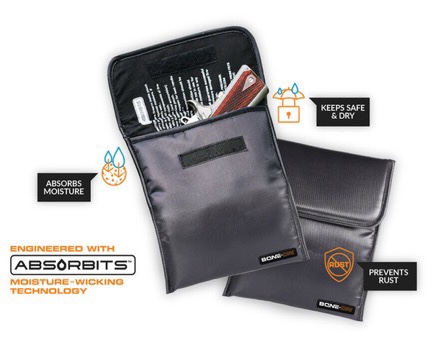
Credit: soldiersystems.net
Frequently Asked Questions On How To Keep Moisture Out Of Gun Safe
What Keeps Moisture Out Of A Safe?
Safes use airtight seals and desiccants to maintain a moisture-free environment. These seals prevent external air and humidity from entering, while desiccants absorb any internal moisture.
What Can You Put In A Safe To Keep It Dry?
To keep a safe dry, place silica gel packs or a dehumidifier rod inside. These absorb moisture and protect the safe’s contents from dampness.
Do You Need To Put A Dehumidifier In A Gun Safe?
Yes, placing a dehumidifier in a gun safe is recommended to prevent rust and moisture damage to firearms.
Can Moisture Get Into Gun Safe?
Yes, moisture can penetrate gun safes if they’re not properly sealed or located in humid environments. Use desiccants or dehumidifiers to protect against dampness.
Conclusion
Protecting your firearms from damaging moisture is straightforward with the right strategies. Use desiccants, maintain a steady temperature, and check seals regularly. Remember, consistent care is key to preventing rust and ensuring your gun safe remains a secure, dry environment for your valuable weapons.
Stay vigilant and your firearms will thank you.
